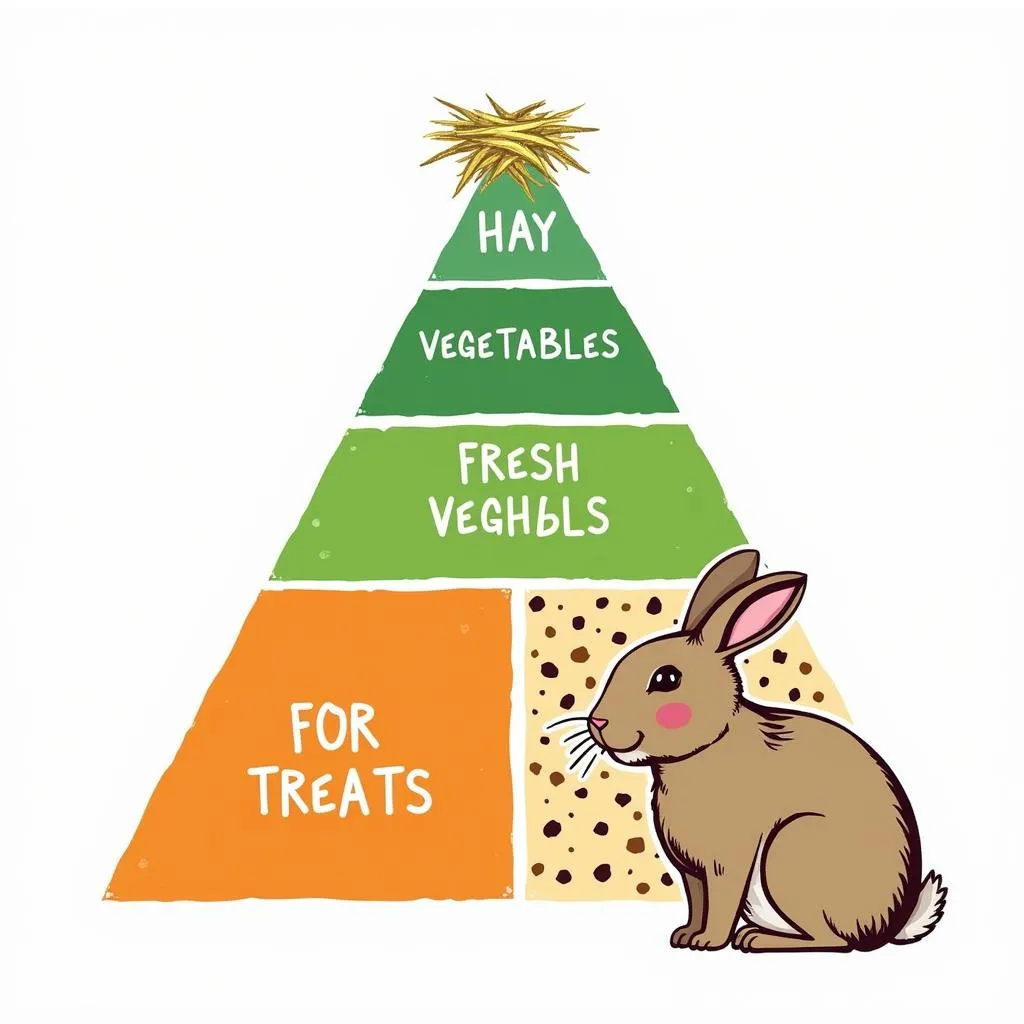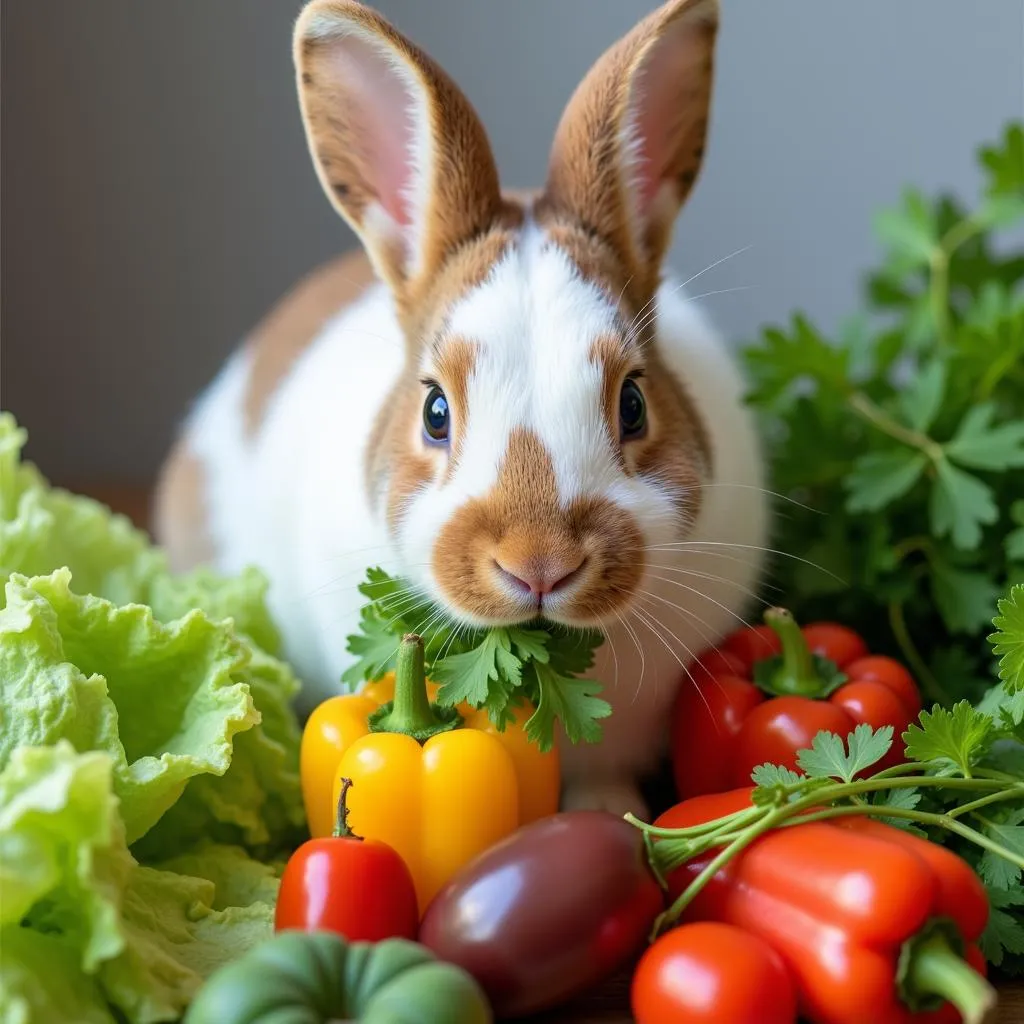The Rabbit Food Pyramid is a simple yet effective visual guide to help rabbit owners like you provide a balanced and healthy diet for their furry companions. Just like humans, rabbits need a variety of nutrients from different food sources to thrive.
Understanding the Building Blocks: What Does a Rabbit Food Pyramid Look Like?
 Illustration of a Rabbit Food Pyramid
Illustration of a Rabbit Food Pyramid
You might be surprised to learn that hay forms the foundation of a rabbit’s diet, making up a whopping 80% of their daily intake. Next comes fresh vegetables, accounting for about 15% of their diet. A much smaller portion, around 5%, is allocated to rabbit pellets, which provide concentrated nutrients. And finally, at the very top of the pyramid, we have treats, which should be given sparingly.
Why is Hay So Important for My Rabbit?
Hay isn’t just about filling your rabbit’s tummy; it’s crucial for their digestive health and dental well-being.
- Digestion Powerhouse: The high fiber content in hay keeps a rabbit’s digestive system running smoothly, preventing potentially dangerous gastrointestinal stasis.
- Dental Dynamo: Chewing hay helps to wear down a rabbit’s teeth, which continuously grow throughout their lives.
- Enrichment and Entertainment: The act of munching on hay provides mental stimulation and helps to satisfy a rabbit’s natural instinct to forage.
Expert Insight:
“Choosing the right type of hay is essential,” says Dr. Anna Hopkins, a veterinarian specializing in exotic animal care. “Timothy hay is a great option for adult rabbits, while alfalfa hay, with its higher calcium content, is better suited for growing bunnies.”
A Rainbow of Freshness: The Importance of Vegetables
 A Rabbit Enjoying a Variety of Fresh Vegetables
A Rabbit Enjoying a Variety of Fresh Vegetables
Variety is the spice of life, especially for your rabbit! Offering a diverse selection of fresh vegetables not only provides essential vitamins and minerals but also adds excitement to their meals.
- Vitamins and Minerals Galore: Leafy greens, such as romaine lettuce, cilantro, and parsley, are packed with essential nutrients.
- Hydration Boost: Vegetables with high water content, like cucumber and zucchini, can help keep your rabbit hydrated.
- Introduce New Veggies Gradually: It’s crucial to introduce new vegetables slowly to avoid upsetting your rabbit’s sensitive digestive system.
Pellets: A Concentrated Dose of Nutrition
While hay and fresh vegetables should make up the bulk of your rabbit’s diet, high-quality rabbit pellets can provide a concentrated source of essential nutrients.
- Look for High-Fiber Pellets: Choose pellets that are specifically formulated for rabbits and have a high fiber content (at least 18%).
- Avoid Seed and Nut Mixes: These mixes are often high in calories and can lead to obesity and other health problems.
- Measure Portions Carefully: Overfeeding pellets can lead to weight gain, so it’s important to follow the feeding guidelines on the package.
Treats: A Little Bit of What They Love
Treats should be given sparingly and should never replace a balanced diet of hay, vegetables, and pellets.
- Healthy Treat Options: Small pieces of fruit, like apple (without seeds) or banana, can be given as occasional treats.
- Avoid Sugary Treats: Sugary treats, such as yogurt drops or processed rabbit snacks, can upset the delicate balance of bacteria in your rabbit’s gut.
Creating a Balanced Diet: Putting It All Together
Remember, the rabbit food pyramid is a guideline, and the exact amount of each food group may vary depending on your rabbit’s age, breed, and activity level. It’s always best to consult with your veterinarian to create a personalized feeding plan for your furry friend.
By following the rabbit food pyramid and providing a varied and nutritious diet, you can help your bunny live a long, healthy, and happy life.
FAQ About the Rabbit Food Pyramid
1. Can rabbits eat carrots?
Yes, rabbits can eat carrots, but in moderation. Carrots are high in sugar, so it’s best to offer them as occasional treats rather than a daily staple.
2. How much hay should my rabbit eat per day?
A good rule of thumb is to provide your rabbit with an unlimited supply of fresh hay. They should have access to hay at all times.
3. What are some signs that my rabbit’s diet is not balanced?
Signs of an unbalanced diet can include weight loss, diarrhea, constipation, dental problems, and a decrease in activity level. If you notice any of these signs, consult with your veterinarian.
4. Can I give my rabbit treats from the grocery store?
It’s best to avoid giving your rabbit treats from the grocery store, as they are often high in sugar, fat, or additives that can be harmful to their health. Stick to healthy treat options, like small pieces of fruit or fresh herbs.
5. How often should I change my rabbit’s water?
You should change your rabbit’s water at least once a day, and more often in hot weather.
Need Help? Contact Us!
Have more questions about the rabbit food pyramid or need help creating a balanced diet for your furry friend? We’re here to help! Contact our team of rabbit-loving experts at Phone Number: 02437655121, Email: minacones@gmail.com or visit us at 3PGH+8R9, ĐT70A, thôn Trung, Bắc Từ Liêm, Hà Nội, Việt Nam. We have a 24/7 customer support team ready to assist you.